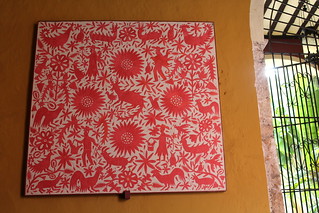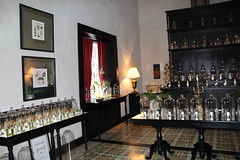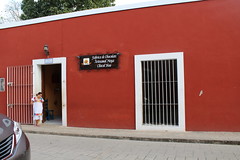page still under construction
Yalat Arte Mexicano
When we were planning our trip to Valladolid, we researched if there were any nearby weaving villages or co-operatives to satisfy a special interest of a person in our party. What we found was that while there is a tradition of hammock weaving in Yucatan, there was very little textile wea ving to be found in this part of Mexico. In the course of our research, one of the people we contacted was John Venator, the owner of Casa de los Venados, the remarkable Mexican crafts museum in Valladolid. He confirmed that while there were few if any textile weavers in the area, there was a very special store in Valladolid whose owner travels all over Mexico with an emphasis on remote villages in Chiapas and near Oaxaca searching for the best and most unique woven textiles in the country.
ving to be found in this part of Mexico. In the course of our research, one of the people we contacted was John Venator, the owner of Casa de los Venados, the remarkable Mexican crafts museum in Valladolid. He confirmed that while there were few if any textile weavers in the area, there was a very special store in Valladolid whose owner travels all over Mexico with an emphasis on remote villages in Chiapas and near Oaxaca searching for the best and most unique woven textiles in the country.
We were fortunate that Maruja Barbachano, the owner of Yalat was in town and we had the chance to spend time with her in the store. Her willingness to share knowledge of each piece, like the Bordados Otomi weaving (shown above right), which can take up to 3-months to make. Maruja not only could tell us what village it came from but also the name of the actual weaver and the meaning of the patterns and woven icons within each piece. All in all, this was a special day for us.
If you are looking for $5 Mexican blankets, save some time and stay far away from Yalat. But if you appreciate fine and unique textiles; things you likely won’t see anywhere else except at the source in more remote parts of Mexico; make a bee-line for this store.
Yalat / Textile & Art Gallery / Address: Calle 41 No. 204, Valladolid, YUC / Phone: 985 856 1969 / yalat.galeria@gmail.com
The Mercado de Artesanías de Valladolid
 There are a number of crafts markets in Valladolid including one known as the Mercado de Artesanías de Valladolid located across the street from the central plaza; a few doors down from Hotel Meson del Marques. It’s a great place to get a general idea of the various local crafts made in the area.
There are a number of crafts markets in Valladolid including one known as the Mercado de Artesanías de Valladolid located across the street from the central plaza; a few doors down from Hotel Meson del Marques. It’s a great place to get a general idea of the various local crafts made in the area.
A significant percentage of the local ladies still wear hipiles and ternos and the gentlemen still wear guayaberas, the traditional attire of Yucatan. The Mercado is a great place to see those items for sale. You’re not going to find museum quality pieces here but if you are looking for a reasonably priced souvenir, this is the place.
Among lots of other items, you’ll also find a wide selection of leather goods.
Elios Leather Shop
We happened to walk by a little leather shop on Calle 37 between Calles 42 and 44 and noticed their display of hand made sandals and boots. Sizes are marked in what look like US sizes but after trying on a few, the shoes seemed to be running 1½ – 2 sizes larger than the marked size. The shop is known as Elios but there is no internet or phone contact.
Calzada de los Frailes (Calle 41A)
Most of the streets in central Valladolid are laid out in a grid pattern with even number streets running north & south and odd number streets east & west. One exception is the very attractive Calle 41A; also known as Calzada de los Frailes, which translates to “Walkway of the Friars”.
It begins a few blocks from the central plaza at the intersection of Calle 41 and Calle 46 and runs diagonally all the way to the Convento de San Bernardino de Siena. With its cobblestone streets, well maintained colonial architecture and abundant street-side plantings, this is considered by many to be the most picturesque street in this most picturesque city. And the attraction has not been wasted by upscale shops.
We took a walk down Calle 41A in search of some the better known stores.
Coqui Coqui is a sweet smelling venture of the Argentine male fashion model Nicolas Malleville. The Valladolid location at Calle 41A #207a is the star of a small chain with stores in Merida, Tulum and Coba.
#207a is the star of a small chain with stores in Merida, Tulum and Coba.
There is a wide selection of beautifully packaged tropical smelling perfumes made with the oils of various citruses, agave, vanilla, coconut and frangipani but if you prefer, the store will create a unique fragrance to your specifications.
In addition to the perfumeria, Coqui Coqui also offers a single luxurious suite for overnight stays and a roof top spa.
Coqui Coqui
Calle 41A 207A, Sisal, 97780 Valladolid, Yucatán, México
01 985 856 5129
Cultivation of Cacao in Mexico can be dated to pre-Columbian times. In fact some historians suggest that cacao was first cultivated by  the Olmecs in parts of what is now Mexico over 3000 years ago. By legend, it was first introduced to Europeans by the Aztec king Montezuma II who served a chocolate drink to the Spanish explorer Hernando Cortes in 1519.
the Olmecs in parts of what is now Mexico over 3000 years ago. By legend, it was first introduced to Europeans by the Aztec king Montezuma II who served a chocolate drink to the Spanish explorer Hernando Cortes in 1519.
Today, cacao remains an important agricultural product in Mexico.
Fabrica de Chocolate Cacao is really not a large operation but they do offer a short tour on the history of chocolate and demonstrate methods of preparation. During the tour visitors are offered free samples of “natural” chocolate plus several different preparations with seasonings like tequila, chile, ginger, cinnamon and anise. The tour is free but many visitors do take the opportunity to buy at the source.
While Cocao describes itself as “the only chocolate factory in the entire state of Yucatan”, there are others cooking, grinding and rolling all natural chocolates locally and some of these can be found in the shops in the same general area of Calle 41A as Cocao.
Cacao
Calle 41A & Calle 48, Sisal, 97780 Valladolid, Yucatán, México
01 985 856 0833
Tequila Tour Los Tres Toños
Calle 41A, Sisal, 97780 Valladolid, Yucatán, México
+52 985 856 1680
